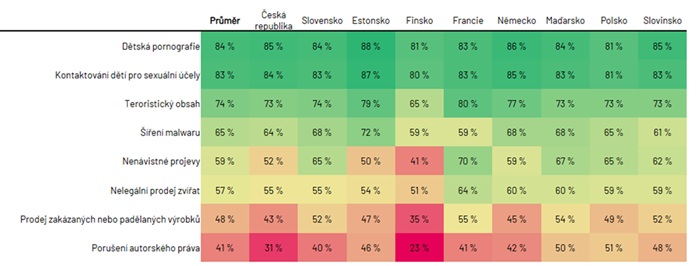The Central European Digital Media Observatory (CEDMO) in cooperation with Ipsos conducted the first wave of the international CEDMO Tracking V4 5 survey in June and July 2025. The study examined public attitudes towards online threats as well as the level of awareness of the Digital Services Act (DSA) regulation.
The results show that Czechs and citizens of other countries perceive child pornography and grooming for abuse as the most serious online threats. These forms of illegal content are considered "definitely harmful" by more than 80% of respondents. On the other hand, copyright infringement and the sale of counterfeit goods are seen as less dangerous to the public. While on average 41% of Europeans consider copyright infringement to be highly harmful, in the Czech Republic this proportion drops to just 31%. Together with Finland, the Czech Republic is one of the countries where digital piracy is perceived as the least harmful. The same is true for the sale of counterfeit goods, which is considered harmful by 43% of Czechs, compared to almost half of respondents in the European average.
According to experts, this may reflect a cultural tolerance of digital piracy or a belief that the victim of counterfeiting is primarily a big brand, not an individual. "A certain cultural tolerance towards digital piracy, which was formed in the 1990s and at the beginning of the millennium, may persist in attitudes towards copyright in the Czech Republic," explains Ivan Ruta Cuker. "The same may be true for the sale of counterfeit products. Although it is an illegal activity, many people do not perceive it as highly harmful because the victim is seemingly just a big brand and not a specific individual," he adds.
 Perceived harmfulness of illegal online content. Research question: 'For each of the following items of illegal online content, please indicate how harmful or harmless you think the phenomenon is. Please indicate your answers on a five-point scale, where 1 means 'definitely harmful' and 5 means 'definitely harmless'. Source: CEDMO, Ipsos
Perceived harmfulness of illegal online content. Research question: 'For each of the following items of illegal online content, please indicate how harmful or harmless you think the phenomenon is. Please indicate your answers on a five-point scale, where 1 means 'definitely harmful' and 5 means 'definitely harmless'. Source: CEDMO, IpsosThe research also looked at awareness of the Digital Services Regulation (DSA), which sets uniform rules for digital service providers across the EU from February 2024. In the Czech Republic, only 14% of the population is aware of the DSA, the lowest of the nine countries surveyed. On average, awareness is around 20%, with the highest in Hungary (28%). Only one third of respondents correctly reported knowing the role of the national DSA coordinator, which in the Czech Republic is the Czech Telecommunications Office.
Experts explain the low level of awareness mainly by the complexity of the topic and the fact that communication has so far been aimed at professionals rather than the general public. According to CEDMO, the DSA thus remains a little-known regulation for most Europeans, even though it has a major impact on the security and trustworthiness of the online environment.
Source: mediaguru.cz

